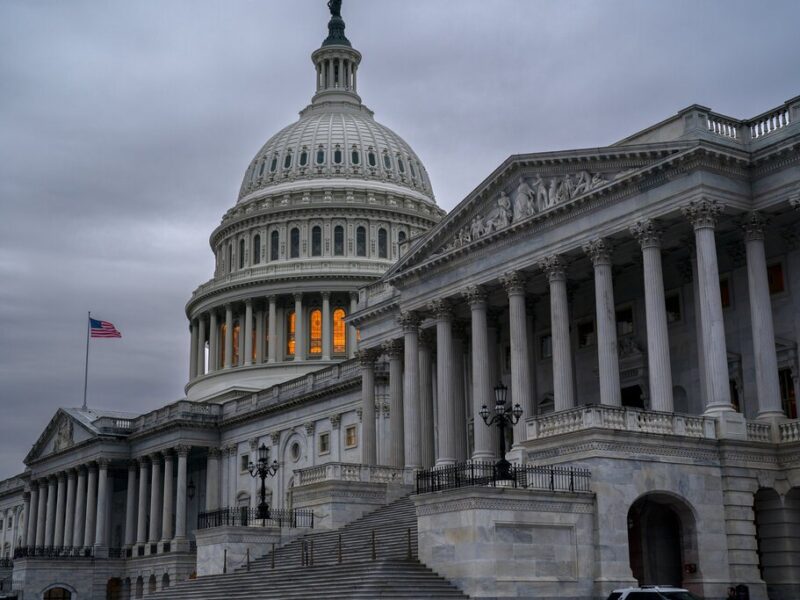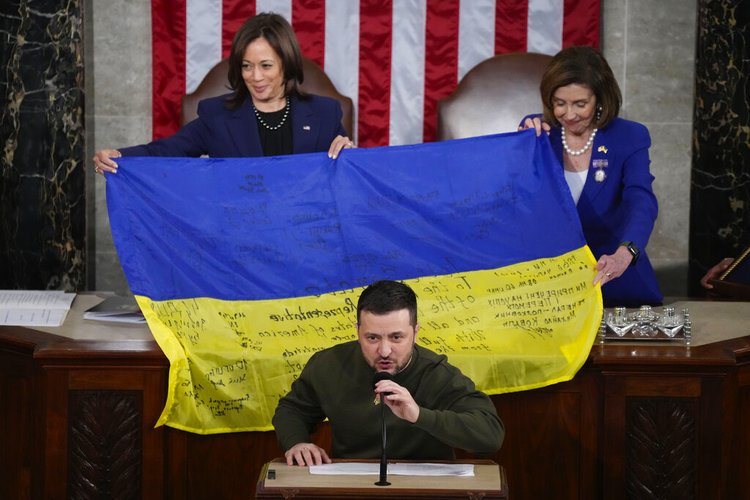Wyoming Delegation Split as Congress Passes $1.7T Government Funding Bill
Cheney supported the package, Lummis called it “irresponsible” and Barrasso didn’t vote
- Published In: Politics
- Last Updated: Dec 24, 2022

Lawmakers narrowly averted a government shutdown by passing a $1.7T spending package Friday, which split both the Wyoming delegation and Congressional Republicans. (AP Photo/J. Scott Applewhite)
By Jacob Gardenswartz
Special to the Wyoming Truth
WASHINGTON — The U.S House on Friday voted to approve a roughly $1.7 trillion federal spending bill for fiscal year 2023, narrowly averting a government shutdown as a once-in-a-generation storm plunged much of the country into sub-zero temperatures. The package, seen as a compromise measure, boosts domestic and defense spending while also incorporating policies ranging from breastfeeding protections for workers to fishing industry regulations.
Because of the size of the package — and the impending funding lapse Friday evening — lawmakers also passed a stopgap measure to extend federal funding through Dec. 30 while the full package is enrolled. This is a routine measure in Washington, where federal appropriators often flirt with hard deadlines. President Joe Biden is expected to sign both measures imminently.

In the Senate, 18 Republicans, including Minority Leader Sen. Mitch McConnell (R-Ky.), joined all Democrats in support of the 4,000-plus page “omnibus” package on Thursday after voting on 15 amendments. Majority Leader Sen. Chuck Schumer (D-N.Y.) called it “one of the most significant appropriations packages we’ve done in a really long time.”
In the House, only nine Republicans, including outgoing Rep. Liz Cheney (R-Wyo.), joined most Democrats in support of the measure, making the final vote 225-201-1. Rep. Rashida Tlaib (D-Mich.) voted “present.”
The package pitted many Republicans against each another, as some conservatives decried the size of the bill while others touted the increases in defense spending. Among the most vocal critics of the spending bill was House Minority Leader Rep. Kevin McCarthy (R-Calif.), who called it “a monstrosity” and “one of the most shameful acts I’ve ever seen in this body.”
The Wyoming Congressional delegation split on the bill: Cheney supported it, Sen. Cynthia Lummis (R-Wyo.) voted against and Sen. John Barrasso (R-Wyo.) did not vote at all.
“We cannot keep spending in this manner if we want to maintain our status as the global financial leader,” Lummis said in a statement to the Wyoming Truth explaining her opposition. “We need to come up with workable, effective solutions that will cut our national debt and preserve our position as the global financial leader.” During Senate debate, she supported several amendments to rein in the bill’s scope, though all were defeated.
Barrasso — one of three Republican Senators not to vote on the spending measure — has come under fire from some in conservative media for his absence, though the bill’s passage was never in question.
In a statement, the third-highest ranking GOP Senator explained, “Over the past week, I’ve been with my wife Bobbi as she continues treatment for cancer.” Asked about how he would have voted, Barrasso pointed the Wyoming Truth to a letter he signed with 13 other GOP Senators in the fall calling for a “clean” funding bill to be passed so lawmakers could reevaluate their spending priorities when Republicans assumed the House majority next year.
“I remain committed to reining in wasteful Washington spending and combating record-high inflation suffocating families across Wyoming,” Barrasso’s statement concluded.
Congresswoman-elect Harriet Hageman, who will replace Cheney in the U.S. House in January, decried the package in remarks on Tuesday. “We have to change the dynamic to change the paradigm of what is going on in Washington D.C.,” she said in Arizona.
Lummis splits with Cheney, argues Americans shouldn’t “foot the bill” of Ukraine war
The funding bill’s final passage came just one day after Ukrainian President Volodymyr Zelensky made his first war-time trip out of his nation to speak before Congress. The measure includes an additional $45 billion in assistance amid the ongoing Russian offensive.
In a statement posted to Twitter, Lummis said Zelensky “struck exactly the right tone” in his remarks, but nonetheless said she opposed funding the Ukrainian war effort, arguing that burden should fall on multilateral organizations like the International Monetary Fund.
“I continue to support America’s resolve to defend Ukrainian self-governance, but without asking hardworking taxpayers to foot the bill, especially at a time when American families’ budgets are stretched due to record high inflation,” Lummis wrote.
Cheney, meanwhile, has been a vocal advocate of American support for Ukraine, often criticizing Republicans who oppose sending additional funding.
Though Barrasso did not vote on the spending package, he has in the past supported funding for Ukraine over Lummis’ opposition.
Funding package overhauls election law Trump sought to abuse
Tucked into the funding package is a reform of the 1887 Electoral Count Act, the law former President Donald Trump sought to use as a pretense to pressure former Vice President Mike Pence to illegally overturn the results of the 2020 election.
The measure clarifies that the vice president does not have such a power and raises the threshold for individual lawmakers to object to the vote results in a given state. It also establishes a legal process for challenges to slates of electors, ensuring an expedited review of such disputes.
In remarks on the House floor earlier this year, Cheney spoke highly of a similar measure, promising it would “prevent future efforts to steal elections” and “preserve the rule of law.”













